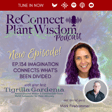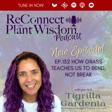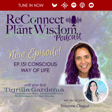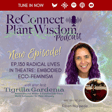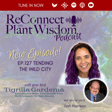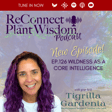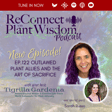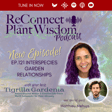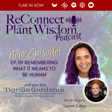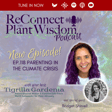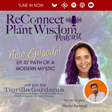
Ep.107 ReWilding Mythology with Wendy Wuyts
Have you ever wondered what myths would sound like if the plants told the story? In this episode, I sit down with ecofeminist researcher and myth-reweaver Wendy Wuyts to explore how storytelling can reshape our relationship with plants, complexity, and ourselves.
Together, we uncover the value of deep listening, narrative intelligence, and rewilded storytelling as tools for healing, resistance, and reconnection in a fragmented world.
If you’re someone who lives between science and spirit, between research and ritual—this episode will feel like home.
Topics Covered about mythology and ecofeminism
➡️ Why myth and narrative are vital tools for healing trauma and reshaping cultural memory.
➡️ How ecofeminist retellings center plants as conscious agents in ancient stories.
➡️ What the Tree of Duality and Snake archetypes reveal about complexity, knowledge, and power.
➡️ The importance of slow hope and multidimensional storytelling in conscious evolution.
Chapters
00:00 Introduction
02:32 Rewriting Mythology Through a Plant Lens
11:30 Wendy’s Early Connection to Nature and Story
22:09 Mythology as Emotional Anchor and Mental Health Tool
33:08 Rewilding Folk Tales with Plants as Protagonists
44:00 A New Approach to Writing with Plants
52:07 Eco-Conscious Business Partner Ad
54:00 From Forest Bathing to Writing Circles
1:03:12 Closing Words and Ways to Connect
Resources Mentioned
🌱 Music of the Plants
🌱 Learn more about Wendy HERE
🌱 Sprouts Writing & Creativity Group
🌱 Plant Wisdom Book Club
🌱 Personalized mentorship with me and the Plants
// Podcast Guest // Wendy Wuyts - Learn more about Wendy HERE
Wendy Wuyts holds a PhD in environmental science from Nagoya University, Japan, and is a writer and certified forest therapy guide.
Expanded Show Notes☝🏽
ReConnect with Plant Wisdom podcast Ancient and modern knowledge from biology to spirituality about the wondrous ways plants help you lead a Naturally Conscious life.
Subscribe here and on your favorite podcast player.
👉🏽 Join the Naturally Conscious Community to nourish human-plant relationships
// Get to Know Me, Tigrilla //
// Let's Work Together //
// Shop from EcoConscious Partners //
Music of the Plants
More Partners
Opening and Closing music by @Cyberinga and Poinsettia.
// Let's Connect on Social // Facebook | Instagram | LinkedIn | Youtube

